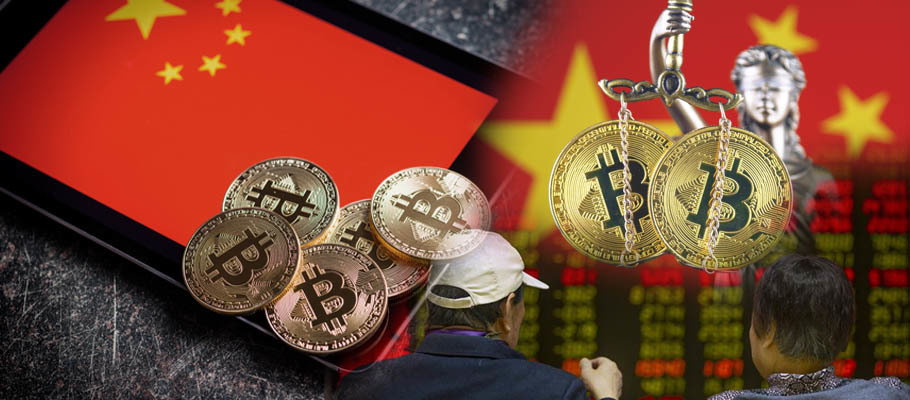
Published: June 7th, 2021
Crypto traders in China are playing hide and seek with the authorities. They take advantage of the hard-to-trace transactions to place secretive bets, giving the government a constant headache to enforce a crackdown. The cat and mouse game unravels an interesting situation in a country that has only stopped short of illegalizing individual virtual currency trading.
It is emerging out of China that investors are paying little or no heed to the government’s attempts to clamp down cryptocurrency trading. The situation underscores the challenge facing Beijing as it struggles to curb a speculative boom in virtual currencies.
Spontaneous selling has almost completely invigorated over-the-counter platforms used by Chinese crypto traders since the country banned domestic exchanges in 2017. But despite the alternatives that traders are using, the critical measure of local sentiment, the price of the China yuan against the stablecoin Tether, tumbled by almost 4.5% after the recent government announcement to increase its crackdown on cryptocurrency trade.
However, according to Feixiaohao, a Chinese cryptocurrency data platform considered the equivalent of CoinMarketCap, crypto prices have since clawed back more than half of the losses incurred.
China decided to heighten the crackdown after a wild increase in the price of Bitcoin, Ether, and other altcoins during the past six months. The price hike increased the Communist Party’s longstanding concerns about virtual currencies’ ability to foster money laundering, fraud and lead to individual investors’ trading losses.
However, the hard-to-track nature of transactions undertaken by peer-to-peer (P2P) networks and OTC platforms makes it cumbersome for Chinese authorities to impose a blanket ban.
Chinese traders’ truancy is a relief to global virtual currency enthusiasts, especially after the recent drop in Chinese crypto buying power led to a massive selloff of almost $1 trillion. The heightened sale pushed Bitcoin prices down almost 20% in less than 24 hours.
Chinese traders have mixed feelings about the situation in their country. According to Charles, a middle-aged real estate consultant and crypto trader in Shanghai, the current environment is not worth anyone’s care. If anything, the market is only taking away part of the profits traders made during the wild price hikes. Charles, who claims to have lost more than $11 million, prefers to hold his coins long-term.
According to Chinese state media, before the country banned virtual currency exchanges in 2017, local investors held an estimated 7% of the globe’s Bitcoin. Besides, they made up about 80% of the world’s cryptocurrency trading. The recent ban makes it cumbersome to gauge China’s exact participation. However, analysts believe the country’s investors still hold a major stake in the virtual currency trade through the offshore exchanges they get to via virtual private networks (VPN) and domestic OTC platforms.
Domestic cryptocurrency trades that involve virtual currencies and yuan may be difficult for the authorities to trace because they take place in two or more steps. First, traders post bids on OTC platforms. Once the buyer and the seller agree on the price, the buyer funds the transaction using a payment platform powered by either a fintech company or bank. The virtual currency the buyer seeks often is held in escrow on the OTC platform and is only released once the yuan equivalent clears.
Because of the multi-leg transaction described above, Chinese authorities have a hard time tracing the whole deal. Besides, since the yuan portion of the deal is undertaken entirely within the domestic financial system, the chances of large-scale capital inflow are minimal. However, that fact has not deterred Beijing from warning individual investors and financial companies to keep off crypto.
In May, the Chinese regulator reminded banks and payment companies about the regulation requiring them to identify and suppress suspicious transactions. The regulator also reiterated to payment service providers that facilitate virtual currency trades violate banking rules.
China’s State Council announced a crackdown on Bitcoin mining and trading, arguing that doing so would help the country fend off financial risks. However, it is emerging that the populous oriental country is enforcing the clampdown because it is worried more about its emission targets than financial risks.
If situations remain unchanged, power consumption from Bitcoin mining alone could peak around 2025, with 300 terawatt-hours going towards the activity. That much power is more than Saudi Arabia and Italy consumed in 2016. Besides, the country would produce about 130 metric tons of carbon emissions around the same time from Bitcoin mining activity alone.
Despite Beijing’s tough stance, the ruling Communist Party’s centenary celebrations on July 1 could offer some reprieve as policymakers try to avoid market disruptions. Huobi announced that it has ceased offering miner hosting services to customers in mainland China soon after the government put up its statement. Besides, it would considerably scale back future contracts and leverage investment products in other markets that are more receptive. However, it is unclear if the firm would shut its OTC platform.
Police in the Chinese capital has distributed leaflets warning residents of the potential risks associated with virtual currencies. The warnings reiterate that cryptocurrencies are among the popular methods that crooks use to scam the public. Further, the leaflets urge the public to contact the police whenever they have difficulty distinguishing suspicious activities involving virtual currencies.
There were unverified claims on social media from individuals claiming that they had been summoned by the police and warned about the risks of investing in virtual currencies. One such individual said the police coerced him to sell his crypto holding, while another said he was instructed to delete a trading app on his phone.
So far, the Chinese police herald the successful cleaning up of the P2P lending platforms two years ago as the hallmark of its virtual currency clampdown. The country purged the industry after the public recorded an increase in frauds that led to street protests in certain instances. The industry had more than 50 million participants holding some $150billion in outstanding loans during its peak days.